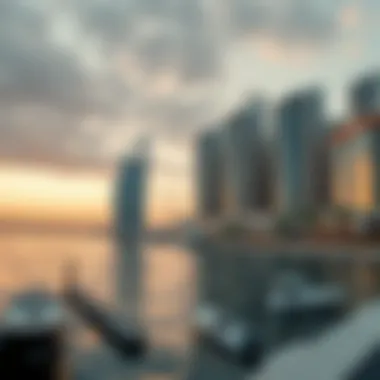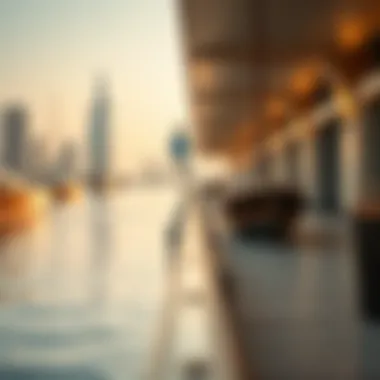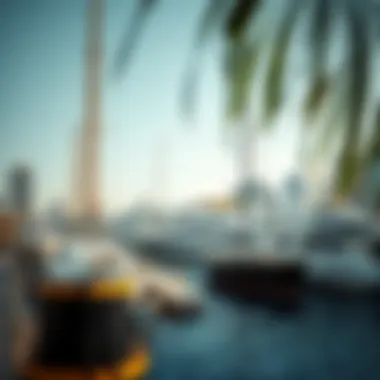Maritime Dynamics of Dubai: A Contemporary Overview


Intro
Dubai stands out as a global beacon of trade and modernity, thanks in no small part to its dynamic maritime industry. The city's rise as a maritime hub is not merely a chapter in its history but an ongoing narrative that intricately links its ports, real estate market, and urban landscape. This evolution is fueled by strategic positioning, necessitating a closer look for those interested in the interplay between maritime activities and property investments.
As more economic activities shift towards maritime logistics, the demand for prime real estate within proximity to shipping lanes and ports is soaring. The resulting implications are profound, impacting how investors, homebuyers, and expatriates perceive living and investing in Dubai. Understanding this relationship is critical, as it shapes both immediate and long-term decisions in the bustling Dubai real estate market.
In light of these dynamics, investors and future residents must comprehend the opportunities and challenges that arise from these connections. Is the maritime influence merely an economic boost, or does it extend deeper into the community and lifestyle of those who inhabit this coastal metropolis? As we navigate through this exploration, we'll unpack insights that are not commonly discussed yet essential for a thorough understanding of Dubai's maritime dynamics.
Property Investment Insights
Market Trends and Analysis
The property market in Dubai is witnessing substantial shifts, heavily influenced by maritime trade activities. A trend has emerged of property buyers gravitating toward areas with easy port access. The busy ports such as Jebel Ali and Port Rashid not only facilitate the movement of goods but also catalyze nearby real estate developments.
Key trends include:
- Increased Investment in Maritime Proximity: Areas like Dubai Marina and Business Bay are becoming hot spots for property investments. The premium placed on waterfront living is palpable.
- Effects of Global Trade Fluctuations: Changes in the global trade environment directly affect property values. Investors are advised to keep a pulse on international trade agreements.
- Demographic Shifts: With expatriates making up a significant portion of the workforce, demand for multi-family and rental properties close to transportation hubs remains high.
Financing Options and Strategies
For potential buyers, navigating the financing landscape of Dubai's property market requires careful planning and strategy. Here are a few points to consider:
- Mortgage Availability: Many banks in Dubai offer competitive mortgage rates specifically targeted towards expatriates. However, understanding lending criteria is crucial.
- Off-plan Investments: With many developments being spurred by maritime growth, buying off-plan can offer significant returns. Make sure to investigate the developer’s track record.
- Joint Ventures: Investors are exploring partnerships to mitigate risks, pooling resources for larger investments in strategic neighborhoods.
As one would expect, exploring these facets of property investment in Dubai reveals a mix of excitement and caution, underscoring the importance of well-researched decisions.
Living in Dubai
Community Highlights and Amenities
Living in Dubai provides an incomparable lifestyle, particularly for those who embrace a maritime backdrop. The city offers a cosmopolitan culture influenced by its diverse expat community. Key highlights include:
- Proximity to Beaches: Residents can enjoy stunning views and leisure activities, making areas along the coast desirable.
- Cultural Hotspots: Places like the Dubai Opera and the Dubai Mall reflect the city’s rich blend of innovation and tradition, drawing in communities from all walks of life.
- Transportation Connectivity: The city's extensive transportation network ensures residents are never far from major business and leisure hubs.
Lifestyle Considerations for Expats
For expatriates moving to Dubai, understanding local customs and lifestyle choices is essential. The lifestyle is marked by a blend of luxury and practicality:
- Social Integration: Expats benefit from numerous networking opportunities through professional organizations and social clubs.
- Healthcare Access: The healthcare system is world-class. Many expatriates opt for private health insurance to ensure quick access to top-tier facilities.
- Work-Life Balance: Dubai promotes a rich work-life balance, with various leisure activities available, from water sports to cultural experiences.
Ultimately, the maritime dynamics of Dubai play an integral role in shaping both the real estate market and the lifestyle of its inhabitants. Understanding this connection will empower investors and residents alike to make informed decisions.
"Dubai's evolution as a maritime city is not just about strategic trade, it's about creating a lifestyle that captures the imagination of the world."
In summary, dive deep into Dubai's maritime dynamics; they could be the key to unlocking many doors, both metaphorically and literally.
The Maritime Legacy of Dubai
Dubai’s maritime legacy is not just a historical footnote; it stands as a foundational pillar for the city’s cultural and economic identity. For centuries, the waters off the coast have been brimming with life, commerce, and opportunities, shaping Dubai into a vital hub for trade in the region. The significance of this legacy is palpable in every facet of the city, from its architectural marvels to its bustling markets.
The relationship Dubai maintains with the sea can be seen as a catalyst for its astronomical growth over the years. With trade routes that date back to ancient times, the maritime activities laid the groundwork for economic prosperity that continues to flourish today. The ports and shipping lanes have played a crucial role in defining not only the economic landscape but also the sociocultural dynamics of the emirate.
Historical Context of Dubai's Maritime Economy
Historically, Dubai's economy relied heavily on fishing and pearling, industries that dominated for generations. The local population engaged in fishing in the surrounding waters, and pearling provided not just sustenance but a means of trade. As demand for pearls surged globally, traders flocked to Dubai, turning it into a bustling marketplace.
The late 19th and early 20th centuries marked a definitive shift, as steamships began to change the shipping landscape. This technological advancement allowed for quicker transportation and greater capacity for goods. The construction of the first port facilities in Dubai, such as the Dubai Creek, laid the groundwork for a more structured maritime economy. By embracing innovation while respecting tradition, Dubai became a formidable maritime player.
In the present day, the historical context of this maritime past informs Dubai’s commitment to solidifying its position as a global trade hub. The constant evolution of trade policies and partnerships, particularly with nations like India and China, underscores how the past is not just remembered but actively influences decisions on the ground.
The Transition from Fishing to Global Trade Hub
As Dubai transitioned from a local fishing community into a global trade behemoth, several factors propelled this growth. The discovery of oil in the mid-20th century was a game changer, infusing capital into infrastructure developments. Ports like Jebel Ali emerged, capable of accommodating the world's largest container ships. This transformation was not merely a matter of scaling operations; rather, it involved rethinking how Dubai positioned itself in the global market.
Today, Dubai is not just a stopover; it's a destination for international trade. The maritime sector is a significant contributor to the GDP, making it a vital component of the emirate's economic structure. Investments in state-of-the-art shipping technology and port facilities have made it easier for global businesses to operate efficiently. Numerous free zones, stretching from Jebel Ali to Dubai Maritime City, entice companies with perks such as tax exemptions and streamlined regulations.


The evolution from fishing to global trade hub has brought not only wealth but also a multicultural tapestry of residents and expatriates, each contributing to the economic vibrancy of the region. This rich maritime legacy continues to inspire and create opportunities in the present context, paving the way for what is yet to come.
"Dubai's maritime history is a testament to its resilience and adaptability, merging past tribulations with future aspirations."
By understanding the underpinnings of this legacy, it positions investors and residents to navigate the intricate pathways that define this metropolis today.
Geographical Advantages
The geographical positioning of Dubai serves as a cornerstone for its maritime and economic prowess. With its location nestled between Europe, Asia, and Africa, Dubai has carved a niche as a hub in global trade. This section explores the strategic aspects of its location and the navigable waters that facilitate seamless connectivity for businesses and activities that thrive in an ever-evolving maritime landscape.
Strategic Location Amidst Key Trade Routes
Dubai stands tall as a pivotal point along key maritime routes that connect major economic regions. These routes not only offer access to vast markets but also provide a significant advantage for businesses looking to expand their reach.
- Proximity to Global Ports: Dubai enjoys close connections to major shipping ports like Singapore, Rotterdam, and Hong Kong. This closeness shortens delivery times and reduces transportation costs, attracting numerous shipping companies.
- Gateway to the Middle East: The city acts as a gateway into the Middle Eastern markets, which present a lucrative demographic with increasing demand for various goods. The interconnectedness of these regions facilitates the movement of products, making it a rewarding point for both exporters and importers.
- Cultural Blend: Owing to its historical ties with seafaring nations, Dubai has become a melting pot of cultures. This multicultural environment enables businesses to engage with diverse clientele and offer tailored solutions.
The strategic location of Dubai positions it as a beacon for shipping and trade. Investors seeking to tap into Middle Eastern opportunities find this geographical advantage indispensable.
Navigable Waters and Port Accessibility
Dubai's intricate waterways and advanced port facilities play a critical role in its maritime dynamics. The ease of access to these navigable waters amplifies the effectiveness of trade operations while also boosting real estate around the coast.
- Jebel Ali Port and Port Rashid: These prominent ports not only facilitate the movement of goods but also accommodate a variety of vessels, catering to both commercial and recreational markets. Jebel Ali is ranked among the world’s top ports in terms of container throughput.
- Depth of the Seas: The natural depth of Dubai's offshore waters supports larger ships, allowing for efficient loading and unloading processes. With the right dredging techniques, these waters accommodate substantial cargo volumes, ensuring streamlined operations.
- Regular Connectivity: Frequent shipping schedules make it easier for businesses to maintain their supply chains and serve their consumers effectively. This regular flow of maritimes keeps the market vibrant.
"Dubai's navigable waters serve as the arteries of its economy, ensuring the lifeblood of trade flows seamlessly."
The outstanding accessibility of Dubai’s ports crucially enhances its maritime capability. As the global demand for swift and reliable trading solutions grows, Dubai remains uniquely positioned, making it attractive for investors in the maritime and real estate sectors.
Infrastructure and Port Development
The ongoing development of Dubai's maritime infrastructure is crucial for enhancing its position as a leading global trade hub. With its strategic location along key trade routes and the rapid evolution of its ports, the maritime infrastructure of this vibrant city powers both economic growth and urban expansion. The ports serve as the lifeblood of Dubai’s economy, allowing for seamless trade and fostering relationships with global markets.
These infrastructural advancements go hand-in-hand with regulatory reforms and technological upgrades aimed at improving efficiency. Beyond their economic implications, they demonstrate Dubai's commitment to modernity and sustainability in maritime practices.
Overview of Major Ports: Jebel Ali and Port Rashid
When it comes to maritime powerhouses within Dubai, Jebel Ali Port and Port Rashid take center stage.
Jebel Ali Port, the largest man-made harbor in the world, boasts a depth of 17 meters and extends over 134 square kilometers. Its facilities cater chiefly to container shipping, making it a focal point for logistics and trade in the region. The port's significant role in facilitating cargo movement is complemented by a free trade zone, allowing businesses to thrive without onerous regulations.
Conversely, Port Rashid is somewhat smaller but possesses its own charm and functionality. Historically, it's been an attractive destination for cruise liners, offering passengers splendid views of the Dubai skyline and luxurious amenities. While Port Rashid operates more on a passenger and smaller vessel scale, its role in the overall maritime tapestry should not be overlooked. Moreover, it reflects the evolving character of Dubai as a tourist destination while still supporting some freight operations.
This bustling dual-port system illustrates Dubai's maritime adaptability.
Technological Advancements in Port Operations
In today's fast-paced world, technology is the game changer, especially in port operations. Dubai's maritime sector is embracing various innovations to increase efficiency and productivity. One of the most notable advancements has been the implementation of smart port technologies. These systems enable real-time monitoring of cargo movements, significantly reducing wait times and operational costs.
Another forward-looking development is the integration of automated cranes and electronic tracking systems. These technologies not only streamline operations but also enhance safety within the ports - a critical concern in such bustling environments.
Additionally, environmentally friendly initiatives have become more prevalent, with many ports incorporating green technologies aimed at reducing their carbon footprints. For instance, the deployment of energy-efficient machinery and waste management systems are helping ports navigate the fine line between growth and ecological responsibility.
"The focus on innovation in port operations epitomizes Dubai’s vision for a sustainable future while boosting its competitiveness in the maritime industry."
The Role of Free Zones
Free zones in Dubai represent a cornerstone of the city's economic model, particularly concerning its maritime activities. These specialized areas are intended to bolster the maritime sector while attracting international business and trade. By permitting 100% foreign ownership and offering tax incentives, free zones have fostered an environment conducive to investment and innovation, further solidifying Dubai's status as a global trade hub.
Economic Contributions of Maritime Free Zones
The maritime free zones in Dubai contribute significantly to the local economy. By providing a flexible framework for businesses, these zones enhance employment opportunities, stimulate local markets, and generate substantial revenue streams. For instance, Jebel Ali Free Zone has attracted thousands of companies, which in turn creates a vibrant ecosystem for logistics, shipping, and ancillary services. This ripple effect can be seen in the increased demand for local labor, technology solutions, and real estate developments aimed at accommodating both businesses and their employees.
"Free zones are not just commercial zones; they are engines of economic growth, driving innovation and sustainability."
In many ways, these zones serve as experimental grounds for economic policies, molding the landscape of Dubai's maritime industry. The tax exemptions and regulatory freedoms allow for trial and error, leading to more efficient port operations, improved logistics networks, and enhanced supply chain resilience. Investors thus recognize the financial viability of establishing operations within these dynamic environments, often leading to long-term collaborations and partnerships that further enhance the economic landscape.
Attracting International Businesses and Investment


The attractiveness of Dubai's free zones lies not just in their economic incentives but also in their strategic location. Nestled within a region rich in maritime trade routes, these areas allow businesses to tap into lucrative markets in Europe, Asia, and Africa. This geographic advantage is coupled with high-quality infrastructure, such as state-of-the-art ports and transport facilities that make logistics seamless.
Moreover, Dubai's political stability and commitment to business-friendly regulations instill confidence in foreign investors. Companies from diverse sectors are drawn not only to the opportunities for growth but also to the collaborative ecosystem cultivted within these free zones. Such environments foster innovation and knowledge sharing, paving the way for new ideas and practices in the maritime domain.
In summary, free zones play a pivotal role in boosting Dubai's maritime economy. They create job opportunities, attract a myriad of international businesses, and stimulate investment, allowing the city to thrive on a global scale. As investors and businesses continue to seize opportunities within this framework, the free zones will undoubtedly remain integral to the shipping and trading dynamics, securing Dubai's place as a leader in maritime commerce.
For more insights on how Dubai’s free zones operate, you might explore additional resources at Dubai World Trade Centre or Jebel Ali Free Zone Authority.
Impact on Real Estate Development
The intersection of Dubai's maritime activities and real estate development is a critical aspect that defines the city's contemporary identity as a global trading center. The maritime sector not only influences urban planning but also fundamentally shapes the residential and commercial real estate market.
Maritime Influences on Urban Planning
Dubai's urban landscape has been meticulously crafted around its maritime infrastructure. Given the city's historical reliance on the sea for trade and resources, planners have embraced this maritime legacy to design an urban reality that prioritizes accessibility and connectivity. The location of ports, such as Jebel Ali and Port Rashid, have dictated the development of surrounding areas, with a focus on mixed-use projects that blend commercial and residential spaces.
- Accessibility to Amenities: Ports naturally attract businesses and services, encouraging the emergence of districts that cater to the workforce and the clientele associated with maritime activities. This ensures that properties in the vicinity often see higher demand and value appreciation over time.
- Transit-Oriented Development: The growing emphasis on transportation networks, which connect waterfront areas to the rest of Dubai, exemplifies how urban planning is influenced by maritime presence. Projects like the Dubai Water Canal have not merely improved logistics but fostered vibrant communities that thrive off the waterway.
Overall, the maritime ecosystem instigates a ripple effect that impacts everything from zoning laws to the sustainability of real estate investments.
Coastal Properties and Market Demand
Coastal properties in Dubai are enjoying a surge in popularity, and for good reason. The city’s unique blend of luxurious living alongside robust maritime activities creates an attractive proposition for homebuyers and investors alike.
- Desirable Waterfront Living: Many people are drawn to the lifestyle that comes with coastal properties. Living by the water often signals exclusivity, and buyers are willing to pay a premium for stunning views and leisure facilities. Developments like Palm Jumeirah and the Dubai Marina exemplify this trend.
- Investment Opportunities: The demand for coastal real estate is further fueled by the influx of expatriates and foreign investors. The desire for ownership in prime locations ensures that properties retain their value, even in fluctuating markets.
- Rental Market Robustness: Coastal areas also benefit from a thriving short-term rental market due to their appeal to tourists. This creates opportunities for property owners looking to diversify their income streams.
To sum it up, the maritime context has enormous sway over real estate development and the dynamics of the market in Dubai. As the city continues to expand, understanding the correlations between maritime activities and property trends becomes imperative for anyone looking to navigate this vibrant landscape.
Sustainability in Maritime Practices
Sustainability is more than just a buzzword; in the context of Dubai's maritime dynamics, it’s a vital element defining the future. As a vibrant hub for international maritime activities, Dubai faces the dual challenge of fostering economic growth while protecting its coastal ecosystems. The maritime industry is a major contributor to Dubai's economy, but this growth should not come at the expense of the environment.
As the world pivots towards sustainable practices, integrating eco-friendly strategies in maritime operations becomes crucial. In Dubai, sustainability in maritime practices involves several core principles, including minimizing environmental impact, conserving marine resources, and promoting sustainable shipping practices. These principles are not mere formalities; they have tangible benefits that extend to local communities, investors, and the broader economy.
Environmental Policies for Port Operations
Dubai’s port operations are pivotal in its maritime ecosystem, making environmental policies not just beneficial but necessary. The government has implemented several regulations aimed at reducing greenhouse gas emissions, managing waste, and maintaining water quality in coastal areas. This includes initiatives like monitoring air quality around ports and promoting the use of cleaner fuels within vessels.
For instance, the Dubai Ports Authority has adopted stringent guidelines to ensure that all commercial vessels meet international environmental standards. Regular audits and assessments help track compliance, ensuring that businesses adhere to sustainable practices. Furthermore, partnerships with environmental organizations lead to collaborative efforts in restoring local marine habitats. This approach not only protects marine biodiversity but also enhances the image of Dubai as a leader in sustainable maritime operations.
Balancing Growth and Ecological Preservation
Finding the sweet spot between economic growth and ecological preservation is a tough nut to crack. As Dubai continues to expand its maritime activities, the question looms large: how can the city balance its rapid development with the need to protect its stunning natural resources? The answer lies in integrated approaches that take into account the long-term health of both the economy and the environment.
One way Dubai is striving to maintain this balance is through sustainable urban planning. By integrating green spaces into coastal developments and investing in technologies like renewable energy for port operations, regulators can reduce the carbon footprint while still drawing in investments. Here, schemes such as Dubai's Green Port Policy play a critical role. This program promotes energy efficiency and sustainability across all levels of port management, ensuring that growth does not negatively impact the environment.
Moreover, stakeholders are increasingly recognizing the importance of engaging communities in maritime projects. This means not only educating the public about environmental practices but also considering local input on development initiatives. A well-informed community can champion ecological concerns, supporting sustainable development that aligns economic opportunities with environmental stewardship.
"Sustainability in maritime practices must be regarded as a pillar of Dubai's maritime strategy, where economic and ecological interests find symbiosis."
In summary, while the maritime industry provides immense economic benefits, the need for sustainability can't be overstated. As Dubai navigates the intricate waters of economic expansion, ensuring sustainable maritime practices will be paramount in securing the city’s legacy for future generations.
Future Trends in Dubai's Maritime Sector
The maritime landscape in Dubai stands at a pivotal juncture, growing ever more significant in the global trade arena. Understanding the future trends within this sector is not just an academic exercise; it plays a crucial role for investors, property managers, and expats alike. Networking with seafaring traditions, elevated by cutting-edge technology and innovation, positions Dubai as a beacon for maritime endeavors. Those keen on navigating the complexities of this evolving domain can benefit immensely by keeping their finger on the pulse of emerging trends.
Emerging Technologies and Their Influence
The ripple effect of technology adoption can be seen across Dubai’s maritime sector. Innovations such as blockchain for logistics tracking, artificial intelligence for predictive maintenance, and Internet of Things (IoT) devices for real-time monitoring are re-shaping operations at a foundational level.
For instance, consider how blockchain is enhancing transparency in transactions, thereby forging trust between stakeholders. By recording each transaction within a secure digital ledger, businesses can significantly decrease the likelihood of fraud. This not only improves logistics but also appeals to firms looking for accountability in their maritime affairs. Additionally, IoT devices are bolstering efficiency. They're paving the way for smarter vessels equipped with sensors that anticipate equipment failures before they occur, minimizing downtime and maximizing output.
ADC Marine, a company based in Dubai, is actively integrating these technologies, showcasing the shift towards more sustainable and efficient operations. Additionally, remote ship management systems are on the rise, allowing operators to oversee vessel performance in real-time without being physically present at ports. All these technologies push traditional maritime practices into the twenty-first century, ushering a new wave of operational efficiency and cost-effectiveness.
Prospects for Maritime Economy Growth


Looking ahead, the prospects for growth in Dubai's maritime economy appear bright and buoyant. The increasing volume of global trade echoes the need for more innovative solutions that can capitalize on existing trade routes through the Dubai region. Experts anticipate significant expansion in sectors such as container shipping and logistics.
To illustrate, the Gulf Cooperation Council's (GCC) ambition to develop infrastructural synergy may yield collaborative benefits, further integrating maritime networks. The focus on enhancing port facilities, alongside increased cargo handling capacity, lays the groundwork for an even more robust economy.
Moreover, the popularity of Dubai as a shipping hub is also reflected in the shipping rates which show a growing tendency upwards. This economic uptick encourages investment in cutting-edge technologies, bolstering both local and foreign investments.
“As trade continues to globalize, Dubai's strategic embrace of technology positions it as a leading maritime hub for the future.”
Rising foreign investment further enhances prospects in maritime real estate, as new facilities spring up to accommodate the surging demand for transport and logistics services. Investors are beginning to take notice, as well, eyeing the possibility of entering a market ripe for emergence and potential profits.
Investing in Dubai's Maritime Real Estate
Dubai's stature as a global maritime hub renders its real estate landscape uniquely compelling, especially within areas influenced by maritime activities. Not only does this sector attract international businesses, but it also presents rich opportunities for property investors and homebuyers eager to tap into the rapid growth of this ambitious metropolis. Investing in Dubai's maritime real estate isn't just about acquiring a property; it’s about understanding the undercurrents that shape the market and leveraging them for maximal benefits.
Evaluating Investment Opportunities
When looking at investment opportunities in Dubai's maritime real estate, it’s wise to consider several key aspects. First off, the geographical significance of Dubai cannot be overstated. Positioned as a gateway between East and West, properties near the waterfront or in coastal areas tend to appreciate in value due to their strategic positioning. Investors should look for developments in areas like Dubai Marina, Jumeirah Beach Residence, and Deira, which are not only popular with expatriates but also exude luxury and vibrancy.
A promising opportunity lies in the freehold areas where foreign ownership is permitted. This type of investment allows expatriates and foreign investors to buy property without the usual restrictions, providing a competitive edge in the market.
Factors to Consider:
- Location Quality: Coastal proximity often influences property value significantly.
- Infrastructure Development: Look for areas where new transport links or amenities are planned.
- Market Trends: Keeping an eye on the demand and supply metrics can clue investors into future price movements.
- Regulatory Environment: Awareness of any changes in local laws affecting ownership and rentals is critical.
Understanding Market Dynamics
Understanding the market dynamics of Dubai's maritime real estate requires a nuanced approach. The blend of the flourishing maritime industry and real estate development creates unique symbiotic relationships. For instance, as Dubai’s ports expand and trade bolsters economic activity, demand for logistics and commercial properties increases.
Key Dynamics Influencing the Market:
- Economic Ties to Maritime Trade: A direct correlation exists between the success of Dubai's ports and commercial real estate. Increased port activity means more businesses are attracted to the region, boosting rental prices and property values.
- International Investment Climate: Dubai has cultivated an investor-friendly environment, offering lucrative returns that are increasingly drawing foreign buyers into the real estate market, particularly within maritime zones. New regulations helping foreign investors can only bolster this trend.
- Urban Development Policies: Movements toward developing areas around maritime zones often include urban planning that enhances accessibility and attractiveness to residents. The government’s commitment to sustainability in urban development can further bolster property values.
- Aftermath of Global Influences: External factors such as global economic conditions, trade agreements, and international relations play a role. For instance, significant movements like the introduction of new trade routes can directly influence local property demand.
To navigate this complex landscape, investors should arm themselves with knowledge, follow real estate trends closely, and perhaps consult with local experts who can provide keen insights and guidance. Recognizing the momentum building in the maritime sector can lead to timely and profitable investment decisions.
"In context, the buoyancy of real estate in Dubai correlates with its maritime prowess, translating into a vibrant investment ecosystem ripe for exploration."
Overall, understanding the depths of this locale's maritime real estate entails both keen insight and strategic foresight, ultimately making it a robust avenue for investment.
Challenges Facing the Maritime Industry
The maritime industry in Dubai, while thriving, is not without its challenges. As the city continues to build its global reputation as a key trade hub, it must navigate several obstacles that can impede growth and stimulate investment anxiety. Understanding these challenges is crucial for stakeholders such as homebuyers, investors, and expatriates who seek to engage with Dubai's maritime economy.
Global Economic Factors Impacting Growth
In an increasingly interconnected world, the maritime sector is significantly influenced by global economic trends. For instance, fluctuations in oil prices can either bolster or hinder shipping operations, as fuel costs can escalate rapidly. When oil prices shoot up, shipping companies grapple with increased overheads, which, in turn, might lead to higher freight charges. This can steer businesses toward alternative ports that may offer more cost-effective solutions, putting pressure on Dubai's competitive edge.
Moreover, global events—be it economic recessions, variations in trade policies, or pandemics—cast long shadows over maritime activity. In recent years, the COVID-19 pandemic served as a stark reminder of how abruptly the tides can change. Disruptions in supply chains meant that ports like Jebel Ali saw a drop in traffic, straining operations and revenues. Investors keen on maritime real estate must consider how these global dynamics can affect profitability and engagement in the region.
- Impact on Trade Volumes:
- Investment Climate Challenges:
- Changes in consumer demand often translate into variances in shipping volumes.
- Trade wars or tariffs can diminish trade activity, impeding local businesses.
- Investors often hesitate when uncertainty looms overhead, leading to slower investments in maritime infrastructure.
- The potential for economic sanctions against countries can suddenly disrupt established trading routes.
These economic pressures underscore the imperative for stakeholders to maintain vigilance and adaptability in navigating the complexities of Dubai's maritime landscape.
Regulatory Hurdles and Compliance Issues
Another significant hurdle in the maritime industry pertains to regulatory compliance. As Dubai strengthens its position as a pivotal maritime center, it also encounters an evolving landscape of regulations that can be as tricky as navigating through uncharted waters.
For instance, the shipping industry must adhere to international maritime laws and local regulations. This often includes complex customs procedures, environmental regulations, and safety standards. Homebuyers and businesses looking to establish operations in Dubai need to be well-informed about these requirements. Non-compliance can not only lead to hefty fines but may even halt operations temporarily, causing significant financial strain.
- Customs and Logistics Regulations:
- Environmental Compliance:
- The necessity for a seamless flow of goods can be hampered by intricate customs regulations.
- Delays in clearance can lead to increased logistics costs, impacting pricing strategies.
- In the wake of global climate change advocacy, maritime operations face stricter environmental regulations, complicating operations and costs for businesses involved.
- Adhering to sustainability policies is increasingly vital. Not only is it a regulatory requirement, but it also shapes brand reputation and customer trust.
As any seasoned player in the maritime sector will tell you, staying ahead of regulations is not just prudent but essential in maintaining operational efficiency. For discerning investors, acknowledging these compliance hurdles is a part and parcel of the maritime landscape that can shape investment trajectories.
Conclusively, the maritime industry in Dubai stands at a crossroads. While opportunities abound, they are embedded within layers of challenges that require insightful navigation. Investors, real estate agents, and expatriates eyeing Dubai must be equipped not just with financial acumen but also an awareness of the regulatory frameworks and economic factors at play.



